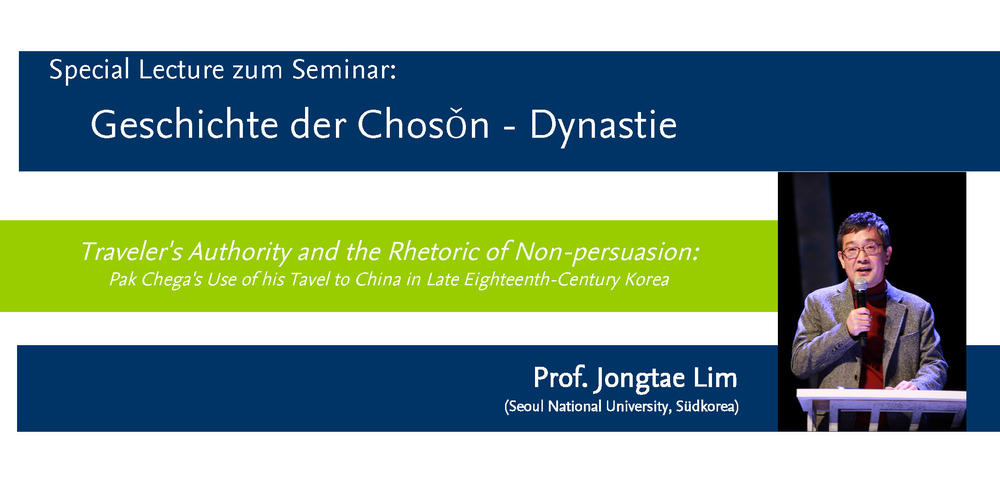(Special Lecture) Prof. Jongtae LIM: Traveler's Authority and the Rhetoric of Non-persuasion – Pak Chega's Use of His Travel to China in Late Eighteenth-Century Korea
Special Lecture im Rahmen der Lehrveranstaltung: Geschichte der Chosǒn-Dynastie
Absract:
After returning from his tributary mission to Qing China in 1788, a young Korean literatus, Pak Chega, drafted a travelogue-cum-reform proposal, titled the Proposal for the Northern Learning. In this, Pak proposed to “civilize” Korea by means of “learning after China,” particularly by adopting its advanced techniques and refined artifacts. This paper takes Pak’s Proposal as an illuminating case to show how intellectuals from cultural peripheries used their journey to the metropolis as a source of authority legitimizing their reformist agenda. A special attention is paid to Pak’s simplistic opposition between the higher cultures of China, on the one hand, and the hopelessly backward cultures of Korea, on the other. The apparent artificiality of Pak’s binary opposition between China and Korea suggests that Pak’s aim was not in persuading the elite audience. Pak rather attempted to construct an exclusive community of the enlightened travelers, only within which his travel experience and reformist vision were properly communicated. This curious rhetoric of non-persuasion reflected Pak’s self-positioning as a privileged traveler, whose exclusive contact to the source of a higher culture put him into an absolute isolation from the rest of society. Pak’s vision of reforming Korea, without persuading the rest of society, necessarily called for the intervention of an enlightened monarch for it to be implemented. In this regard, Pak was not especially different from the modernizers in twentieth-century Korea, who would rely on the developmental state to realize their elitist program of Westernization.
Professor Jongtae Lim works in the history of science in Korea, focusing particularly on the modern transformation of Korean science from seventeenth to early twentieth century. His research deals with the transmission of European science into the intellectual society of late Chosǒn period and the subsequent interaction between the foreign science and the traditional knowledge of nature. Opposing to the conventional historiography that has emphasized the 'modernizing' influence of Western science on the late Chosǒn sirhak scholarship, Prof. Lims research highlights the efforts of yangban literati to incorporate the foreign science into the indigenous system of knowledge, the efforts that produced a hybrid of the East Asian and European knowledge of nature.
Zeit & Ort
26.06.2017 | 18:00 - 20:00
Institut für Koreastudien
Fabeckstr. 7
14195 Berlin

